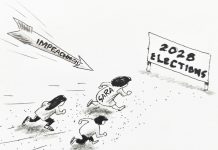As the country’s debts keep rising, billions vanish from the government coffers, piled high on the backs of ordinary Filipinos. This is corruption at its most shameless form, where public funds meant to build schools, hospitals, and roads are plundered while citizens are left gasping under the weight of poverty. What is happening is despicable, and it has stripped the people of hope that the country will ever move forward.
One does not need a magnifying glass to see the scale of this rot. Commission on Audit reports year after year reveal anomalies that stretch into billions—overpriced supplies, ghost projects, and missing funds. What is meant for classrooms ends up in the luxury cars of politicians; what is borrowed for public health is siphoned into private pockets. The tragedy is that these numbers are not abstract figures, but lifeblood drained from the nation, money that should have saved lives, uplifted families, and built opportunities for a better future.
The burden is not just economic—it is deeply moral. Corruption normalizes greed, dulls the conscience, and teaches the next generation that dishonesty is the only way to get ahead. Children grow up seeing the same faces accused of plunder returning to power, unashamed, unpunished, and even applauded. This moral bankruptcy is far more dangerous than the loans themselves, because it hollows out the very soul of a nation. How can people believe in justice when the thieves walk free and the poor must carry the debts they never benefited from?
Filipinos have long been known for their resilience, but resilience has its breaking point. When salaries barely cover basic needs, when jeepney drivers struggle with rising fuel costs, when farmers sell their produce for less than the cost of production, the knowledge that billions have been pocketed by officials is like salt rubbed into an open wound. People are not simply struggling with poverty—they are choking on the betrayal of leaders who were entrusted with their welfare.
Every peso borrowed by the government is a peso that citizens will pay for through taxes. And yet, the cycle is obscene: funds are borrowed, pocketed, lost to corruption, and then repaid by the very people who never saw the fruits of those loans. It is like being forced to pay for a banquet where one was never invited, while the same gluttons who gorged themselves rise from the table untouched and smiling. This is why hopelessness festers—because the system itself is rigged against the people.
The damage extends beyond the present generation. The ballooning national debt means that even unborn Filipinos are already in the red, shackled before they can even take their first breath. What could have been their schools, their hospitals, their public parks are mortgaged away by thieves whose names are etched not in history books of greatness but in ledgers of crime. The theft of the nation’s wealth is not just about missing billions—it is about stolen futures.
What makes the betrayal unbearable is the impunity. Scandals come and go, senators and congressmen conduct hearings for show, investigations are dragged out until the public forgets, and in the end, no one of consequence goes to jail. It is this culture of consequence-free plunder that has hardened into the nation’s greatest curse. If thieves are rewarded instead of punished, then corruption ceases to be an aberration and becomes the system itself.
There is only one way out of this cycle: accountability must be real, swift, and ruthless against those who treat public office as a personal business. Institutions must not only expose anomalies but also ensure convictions. Filipinos deserve a government that treats every peso with sacred trust, for this money is the sweat of laborers, the sacrifice of OFWs, and the hope of every child yearning for a future. Without this, the people’s despair will not end, and the dream of national prosperity will remain forever stolen.




